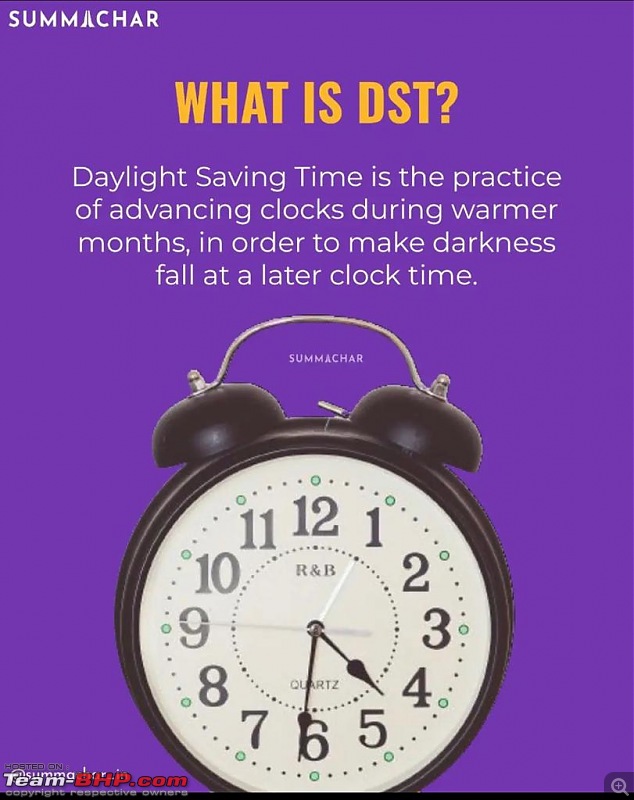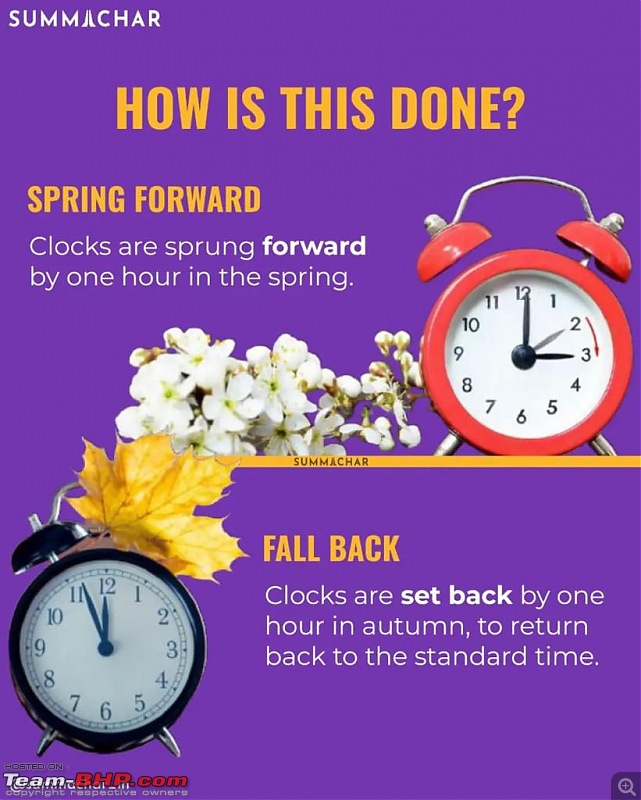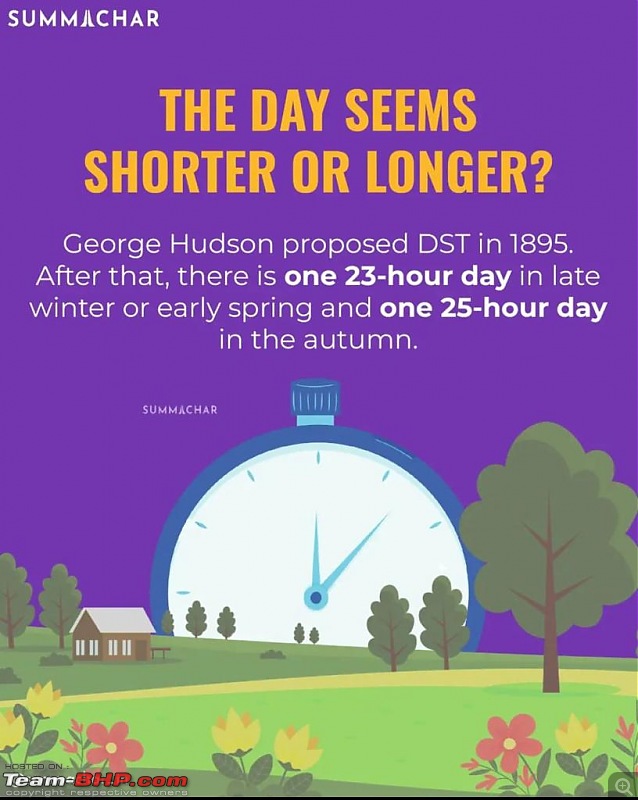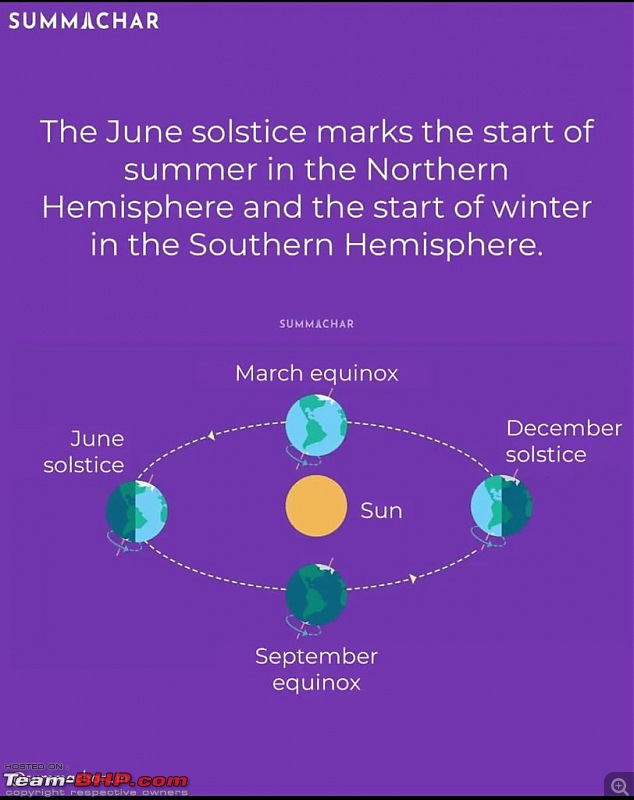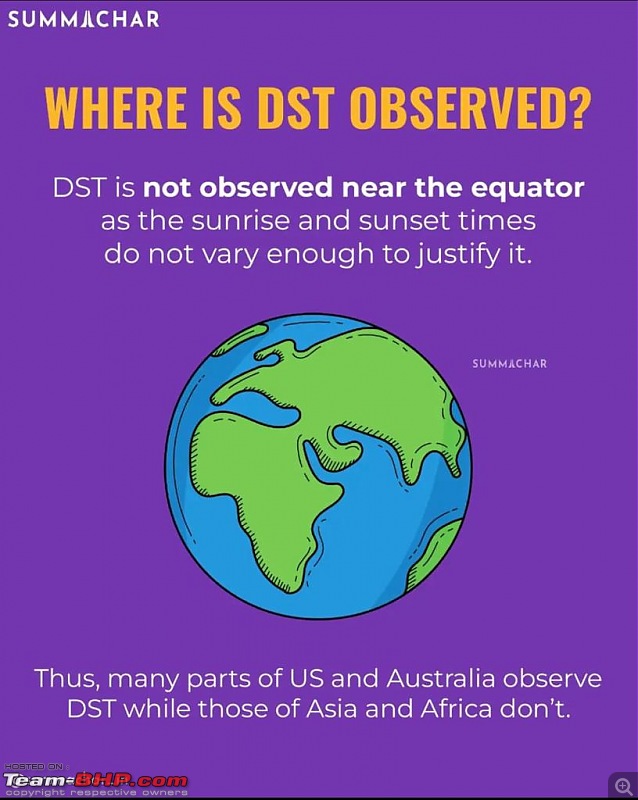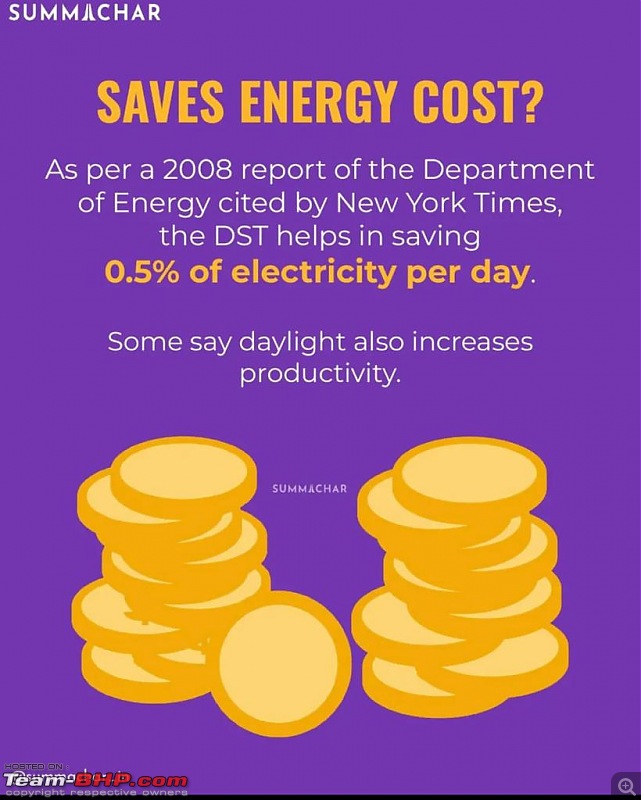Team-BHP
(
https://www.team-bhp.com/forum/)
It still needs to go through house and also it will come to force in 2023. They want to allow time for things like flight operators to adjust their timings/reservations etc.
I always thought while living in US that the DST should be the other way !
Not using daylight savings is not going to make any difference in time daylight is available. It will still feel weird to have daylight at 830 pm in summer and pitch darkness at 4pm in winter.
Am sure Nordic members would have even weirder stories of going to office and returning home in darkness rl:
I haven't seen any difficulty in children, at the most it'll take a day or 2 for them to adjust.
In a way DST helps, not to have darkness at 3 pm, instead of what would have been 4 pm.
Meanwhile, for many decades, our own Northreastern states are fighting to have DST. In a way we should have 2 timezones, given we have a good 30 degree swing between Koteshwar in GJ and Kibithu in AR.
As an average offshore IT joe having most probability of clients living in US Eastern time zone, would be happy if daylight saving time or summer time becomes new standard time. As it would mean (IST) evening calls (which typically starts with "Good Morning ...") won't be shifted to one hour late (as per IST) from November.
In the absence of daylight saving, people & enterprises on their own would an start the work early and finish early. In any case most of the factory work on shifts so it doesn't make any difference to them.
For those on general shift, I am sure both employees and employers would mutually prefer start and stop of workday based on season (e.g. 8 to 4 working during summer and 9 to 5 working during winters).
I am not sure what extra benefit is derived by officially changing everyone's clocks?
Though DST is followed by many western countries, Arizona still does not follow it. As a result, there is a bit of confusion in the US.
Though DST might be beneficial, it is detrimental to those in India who work US hours or early US hours. For example, someone working from 3:30 PM IST to 12:30 AM IST (to match 6 AM EST to 3 PM EST), would need to work from 4:30 PM to 01:30 AM IST when DST kicks in early November.
I used to work in that shift, but luckily it was made clear to all my clients and US colleagues that my winter timings would advance by an hour ---from 5 AM EST till 2 PM EST. Long story short, my work was always from 3:30 PM IST to 12:30 AM IST throughout the year. Some US colleagues took a long time understanding why there is no DST in India.
Quote:
Originally Posted by alpha1
(Post 5282120)
In the absence of daylight saving, people & enterprises on their own would an start the work early and finish early. In any case most of the factory work on shifts so it doesn't make any difference to them.
For those on general shift, I am sure both employees and employers would mutually prefer start and stop of workday based on season (e.g. 8 to 4 working during summer and 9 to 5 working during winters).
I am not sure what extra benefit is derived by officially changing everyone's clocks?
|
This should be our approach rather than changing clocks officially which require changes at multiple levels. Adapting work schedule as per season will be much more simple.
Why can't countries stick to uniform time through out the year and get rid of this DST business altogether? May be it made sense in olden times to save energy costs (e.g turning off street lights 1 hour earlier in summer), but in modern world is it still needed?
History of Daylight Saving Time (DST)
It will be interesting to see the effect of this in various legacy IT systems, where time conversion from one timezone to another is needed frequently. Some extra work coming our way, IT folks!
Quote:
Originally Posted by vnabhi
(Post 5282649)
Though DST might be beneficial, it is detrimental to those in India who work US hours or early US hours. For example, someone working from 3:30 PM IST to 12:30 AM IST (to match 6 AM EST to 3 PM EST), would need to work from 4:30 PM to 01:30 AM IST when DST kicks in early November.
|
I think you are saying the opposite. In November, DST is turned off, and it is turned on in March. So it's actually beneficial for us in India if DST is on throughout, so everything is one hour earlier like in summer months.
From what in understand, the proposed change is to make DST
permanent. If that's the case, even in winter months 6 AM EST would mean 3:30 PM IST, so it's good for us in India.
Quote:
Originally Posted by vnabhi
(Post 5282649)
Though DST might be beneficial, it is detrimental to those in India who work US hours or early US hours. For example, someone working from 3:30 PM IST to 12:30 AM IST (to match 6 AM EST to 3 PM EST), would need to work from 4:30 PM to 01:30 AM IST when DST kicks in early November.
|
DST is in effect from March to October and they shift to normal time in November.
Hence from 2023 permanently 6 AM ET will be 3:30 PM IST.
Quote:
Originally Posted by alpha1
(Post 5282120)
I am not sure what extra benefit is derived by officially changing everyone's clocks?
|
You'll have a mess of individually defined timings for schools, government offices, private shops that varies seasonally according whims and fancies.
Ever seen cricket matches played in Guwahati in the winter and spring months where you never see teams bowling the full quota of overs.
Everyone changing their clocks is not as dramatic as it sounds. It might feel strange for that Sunday and Monday and then you get used to it.
Quote:
Originally Posted by SilentEngine
(Post 5283002)
It will be interesting to see the effect of this in various legacy IT systems, where time conversion from one timezone to another is needed frequently.
|
Isn't TZ already part of several systems? I work with an enterprise system, where the timezone display shows Standard and Daylight times in terms of the trigrams. There is no real conversion that happens anywhere. Few companies that have global usage of systems stick to UTC or GMT
Quote:
Originally Posted by SilentEngine
(Post 5283002)
May be it made sense in olden times to save energy costs (e.g turning off street lights 1 hour earlier in summer), but in modern world is it still needed?
|
Today we have sensor based switching, so it is obviously irrelevant.
But even in the past - street lights were run during the night time. Dusk to Dawn.
This duration changes with season [might be 6 hours in summers and 8 hours in winter].
How does turning clock forward or back by 1 hour / 2 hours or 4 hours help with duration of an activity (and therefore the costs)? Quote:
Originally Posted by narayans80
(Post 5283043)
1) You'll have a mess of individually defined timings for schools, government offices, private shops that varies seasonally according whims and fancies.
2) Ever seen cricket matches played in Guwahati in the winter and spring months where you never see teams bowling the full quota of overs.
|
1) I don't think we have any uniform start stop time across India. I have seen Schools at some places start at 7 am and some places 9 am.
I have seen govt offices start at 8 am some places and 9 am some places (within the same city!)
I have seen business establishments that start at 10 am and the next door establishment would be starting at 11 am.
To steal your phrase - it already "varies according whims and fancies". There is absolutely no justification of DST for this scenario.
2) The problem you talk about cricket match is due to DURATION of sunlight. In winters the duration is short whereas in summers it is long.
Transposing everyone's clock does not solve this issue.
###
I might come across as opposing the DST. Well on the contrary, I would be happy to follow and peddle it, but I am yet to come across a compelling reason for doing so.
Quote:
Originally Posted by narayans80
(Post 5283043)
Isn't TZ already part of several systems? I work with an enterprise system, where the timezone display shows Standard and Daylight times in terms of the trigrams. There is no real conversion that happens anywhere. Few companies that have global usage of systems stick to UTC or GMT
|
Yes, it should be, and sticking to UTC is the right thing, which makes life easier. Conversion for display purpose would usually happen through a standard timezone database like
tz db which is part of most of the operating systems and frameworks today (Unix, Mac, Android, iOS etc). Microsoft used to maintain its own version of timezone database in Windows and i think that's still the case.
I was thinking of scenarios where data transfer is from third party external systems who don't maintain dates in UTC (i have seen some like this, these are very bespoke systems not following any standard as such), and interpreting those dates becomes somewhat tricky.
Anyway, i know it's not such a big deal, because the ecosystem continuously evolves to keep the Timezone DBs relevant and latest, and 18+ months should be good enough to plan for this.
Quote:
Originally Posted by alpha1
(Post 5283055)
Today we have sensor based switching, so it is obviously irrelevant.
But even in the past - street lights were run during the night time. Dusk to Dawn.
This duration changes with season [might be 6 hours in summers and 8 hours in winter]. How does turning clock forward or back by 1 hour / 2 hours or 4 hours help with duration of an activity (and therefore the costs)?
|
No, it doesn't help to control the duration of activity. I believe the motivation here was to align the time of the activity to sunrise. Moving 1 hour back/forward tries to artificially align sunrise and cause the sunset to extend further by one hour.
Cost saving - that's debatable.
Arguments in favour of DST on/off system - this is what i have heard:
One can start the day at same time everyday of year, but in summer you get extra couple of hours of sunlight in the evenings to plan any outdoor activities. In absence of DST, the additional sunlight is distributed in morning and evening. The 'saving of daylight' is basically moving 1 hour of daylight from the morning to evening in those months.
Quote:
Originally Posted by alpha1
(Post 5283055)
1) I don't think we have any uniform start stop time across India. I have seen Schools at some places start at 7 am and some places 9 am.
I have seen govt offices start at 8 am some places and 9 am some places (within the same city!)
I have seen business establishments that start at 10 am and the next door establishment would be starting at 11 am.
|
Let's not bring India to the discussion here. Where timing and punctuality are taken for granted.
I've had the opportunity to spend 4-5 years on either side of the pond. Schools are public schools which have standard timing across the country. I used to live in a small village which had no highschool, one had to goto Modena for it. There were public transportation buses like 5 or 6 in a 20 minute gap between 0700 and 0720 am that catered to such kids.
---
Having an earlier sunset isn't such a big deal. But having a late sunrise is. Have we not felt like waking on those dark gloomy rainy mornings? And worse, waking up kids to goto school.
So will they average the times and move it by 30 minutes once-for-all ?
What about the states where the time change is done differently than the practice of 1 hour across other states ?
Dont know how they will do this change, what they will follow in future. DST has been debated, and some discussions show that rather than savings, people spend more on electricity. But as we move to the northern parts of mainland USA, the difference in sunrise/sunset and duration of daylight between summer and winter is quite a bit to have supported the practice all these years.
Quote:
Originally Posted by condor
(Post 5283293)
So will they average the times and move it by 30 minutes once-for-all ?
|
I think the plan is to make the Daylight Saving Time, which is in effect now, permanent.
| All times are GMT +5.5. The time now is 18:47. | |



